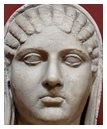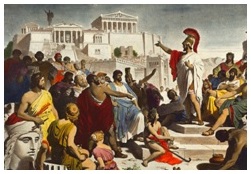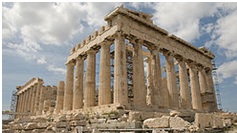|
 |
|
 |
|
|
||
Pericles Leadership
Pericles (c495-429 BC)
The greatest leader of ancient Greece (pictured right), who made Athens (then an independent state) great.
Why was he a great leader?
1. Character He was a man of great integrity and dignity, who lived by his principles, particularly patriotism, freedom and democracy. Despite his privileged and wealthy upbringing (his father was Xanthippus who defeated the Persians), he gave the vote and government jobs to ordinary people, because he valued them as human beings and invaluable members of his army and navy. But controversially he only gave these rights to people with Athenian parents. He lived simply (often avoiding banquets), because he:
His self-control also made him patient and calm under pressure. He successfully and courageously fought to defend his friends from political attack like his mistress ,
Aspasia (pictured right), and the philosopher, Anaxagoras 2. Competence, learning and reflection He was
Pericles once used his astronomical knowledge to calm his navy, frightened by an eclipse of the moon.
3. Communicator Pericles could inspire people with his great speeches. His famous Funeral Oration 431 BC (pictured right in Philipp von Foltz's painting), praised those Athenians killed in battle “who knew their duty and had the courage to do it”. He also valued discussion as vital to wise action.
4. Charisma He had great presence and used his charisma to win people’s support and defeat his political opponents.
5. Culture He had the far-sightedness to believe that the arts and education were just as important as money and winning wars. He paid for the poor to see plays for free, and built beautiful buildings like the Parthenon (pictured right) and the Acropolis, despite using the money of his Greek allies to do so! Great philosophers like Socrates (pictured right below) also thrived under his rule. 6. Intellect and effort Pericles had the brains, self-confidence and dynamism to
7. Involvement Pericles always discussed issues thoroughly before making a decision. “Instead of looking on discussion as a stumbling block in the way of action, we think it an indispensable preliminary to any wise action at all”, he said.
Key quote on happiness Happiness depends on being free, and freedom depends on being courageous.
Key quote on freedom Freedom is the sure possession of those alone who have the courage to defend it.
Key quote on success “Wait for the wisest of all counsellors, time” (on the need for patience).
Key quote on leadership The bravest are surely those who have the clearest vision of what is before them.
|
|
|
||
|
|
||
| Copyright © wisdomtowin.com 2025 All Rights Reserved | ||
|








